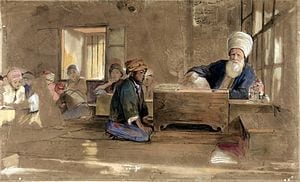“Now that,” I said, “would be the real Arab Spring.”
A FEW weeks ago, I was in Amman, Jordan, talking with educators, when I met a young American woman with the most remarkable job description. Her name was Shaylyn Romney Garrett. She introduced herself by saying that she and her husband, James, were former Peace Corps volunteers in Jordan who had stayed on to start a nonprofit, Think Unlimited. It helps Jordanian schoolteachers learn how to “teach creative thinking and problem solving” in their classrooms. “Now that,” I said, “would be the real Arab Spring.”
Rote learning is still the dominant education method in most Arab public schools. The Garretts, with some backing from Queen Rania of Jordan’s school-reform initiative, designed a program to enable and inspire Jordanian teachers to adopt a much more creative approach to education. They also conduct summer “Brain Camps” for young students to hone their problem-solving skills by creating solutions for water shortage. Garrett told me one story, though, that really stuck in my mind.
“There was a 16-year-old girl in our Peace Corps village in Jordan,” she said. “She came from a very conservative family, always wearing Islamic dress. When you asked her what she wanted to be when she grew up, she said ‘doctor,’ which is what they all say, because it is the most prestigious job. After completing our six-day summer camp, she realized, though, that she could do something else with her talent, that she could be a change-agent. So she started a girls’ club in the village. [At the camp,] we teach kids the concept of ‘brainstorming,’ and one day we were walking together and she was running ideas past me, and she said, ‘Miss Shaylyn, I stormed my brain last night to think of different ideas for what the theme of my club should be.’ She eventually made it a leadership club.” It was an example, said Garrett, of taking a specific creative-thinking skill — brainstorming — and applying it to her community.
The Arab awakenings may or may not succeed in ousting the dictators, but they will have no chance of really empowering the new generation without this kind of revolution in education. The Arab awakening — at its core — was a nonreligious event, led by young people frustrated that they lacked the space, job opportunities and educational tools to realize their full potential. That was the volcanic energy source that blew the lid off Egypt, Tunisia, Syria, Yemen and Libya. While Islamist parties have seized this opening to initially take power, if they don’t satisfy the aspirations of those youths who stormed their brains and then stormed the barricades, they will — sooner or later — get blown away just like the Mubaraks and Qaddafis.
via New York Times – Tom Friedman
The Latest Streaming News: arab education updated minute-by-minute








